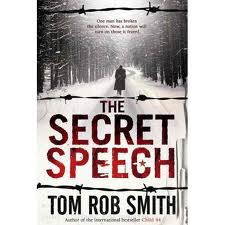The Krushchev Thaw refers to a period in the mid-fifties to early sixties, right after Stalin's death, when Krushchev denounced Stalin and the atrocities committed under his regime. This ushered in a fleeting period of openness and relative freedom in the Soviet regime. Krushchev first signalled this movement in The Secret Speech, delivered behind closed doors to the 20th Party Congress in 1956.
The Secret Speech, by Tom Rob Smith, swirls around the events sparked by the speech - the dissemination of the speech in printed form*, the political upheaval in Moscow as power shifted and the old hardliners ran scared, life in the Siberian Gulags and the Hungarian revolution**. It takes considerable, and not very believable, contortions to steer the plot through all these events.
Former state security officer Leo Demidov returns from his appearance in Smith's first book, Child 44. Demidov is the head of a homicide department in Russia; a rather unpopular position, because authorities do not want to acknowledge that there is such a thing as murder in the Soviet Union. Demidov is trying to be a good man, after his murky past when he arrested many civilians based on nothing more than typed lists of names. These days, he pursues 'evidential truth , not a politicized one" as he seeks to solve crimes. It's a precarious job because the truth is not always what the authorities want, especially in a country where it's an embarrassment to even acknowledge murder takes place.
I chose The Secret Speech because I'd enjoyed Child 44 by Smith, which also features Leo Demidov as the key character. But this plot was just too far fetched for me. One star.
*I don't know enough about Russian history to know if this wide dissemination is totally fictional. Wikipedia says it was only distributed to select Communist Party members in Russia, before widespread dissemination internationally.
** The book portrays the Hungarian Revolution of '56 as having been sparked by Soviet agents provocateurs. This was to give the Soviets an excuse for massive retaliation. Brutally crushing the uprising was to send a message that despite Krushchev's speech, the Soviets hadn't gone soft. Again, in my limited research, I found no corroboration for this analysis.


No comments:
Post a Comment